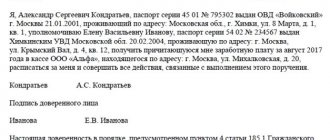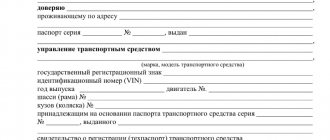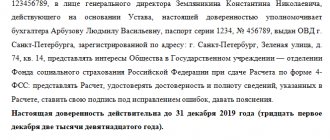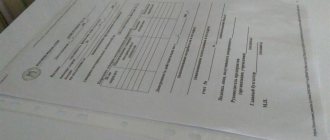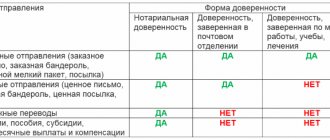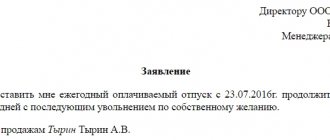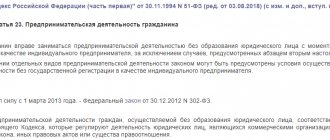What is a general power of attorney?
A general power of attorney is a document under which the authorized person has a number of powers. According to Art. 185.1 of the Civil Code of the Russian Federation, this type of documentation is subject to mandatory notarization.
Actions under a general power of attorney always entail changes to state registers. For example, if a trustee is authorized to conclude a purchase and sale transaction, in the future it will be necessary to make adjustments to the Unified Register of Rights to Real Estate.
In essence, by issuing a general power of attorney for property, the owner transfers the right to dispose of it to a third party. It can act within the text of the paper at its discretion.
The only thing that remains inaccessible to the trustee is the execution of a deed of gift or will. It is possible to donate property using this document only if the text of the document directly states not only the right to perform this legal action, but also the data of the donee. In the case of a will, there are no exceptions - only the owner can write it.
In what cases is a general power of attorney terminated?
- when the period indicated therein expired;
- voluntary refusal of the attorney from the powers granted by the power of attorney;
- bankruptcy of the principal if, according to the law, he has lost the right to issue powers of attorney;
- death of the represented person, as well as restriction of his legal capacity or complete deprivation of it;
- recognition of the principal as missing;
- revocation by the principal of the issued power of attorney. In relation to the general power of attorney, it is also notarized, as is its issuance. In the case of a general power of attorney, this is a painful procedure, since it will be necessary to notify all individuals and legal entities with whom the attorney interacted within the framework of his powers;
- division, merger, consolidation or complete liquidation of the company that issued the power of attorney;
- death or restriction of legal capacity of the attorney, as well as if he is declared missing.
What does a general power of attorney give for an apartment, house or land?
A general power of attorney provides the owner’s representative with very extensive powers:
- carry out actions to prepare all necessary documents relating to the property;
- participate in organizing transactions;
- sign documentation on behalf of the owner;
- participate in financial transactions;
- manage the legal fate of the entrusted property;
- other powers provided for in the documentation.
The authorized person has the right to sell the entrusted property, lease, exchange, pledge and perform other actions if they are provided for within the document.
In addition to general powers of attorney, there are two more types of powers of attorney:
- one-time – intended to perform a specific action once;
- special – issued for a specific period for specific actions.
As a rule, both types of documents are used to prepare papers for transactions. For example, the owner can entrust this action to a realtor or a lawyer hired for these purposes.
It is impossible to conduct a transaction and transfer property rights to another person using a one-time or special power of attorney. This can only be done with a general document certified by a notary. Moreover, the text of the document must specify the specific property and the type of the planned transaction.
Rights and obligations of the principal and attorney
The attorney is obliged:
- fulfill your obligations towards the principal in good faith;
- in some cases, provide a report on the funds spent;
- act only within the limits determined by the document in question;
- take all measures within his power to carry out the actions specified in the power of attorney.
The attorney has the right:
- require the principal to provide the funds necessary to perform actions under the power of attorney,
- demand the principal compensation for material damage caused by the performance of actions specified in the power of attorney;
- at any time declare a refusal of the powers granted to him by power of attorney.
In some cases, the attorney acts on a fee basis; accordingly, he also has the right to demand payment of the remuneration due to him under the terms of the transaction.
The person who issued the general power of attorney is obliged to:
- bear responsibility for the actions of the attorney and their consequences, if they were committed without exceeding the powers of the attorney;
- reimburse the authorized person for the expenses that he incurred as part of the performance of his duties (but only if there is reliable evidence of this, for example, receipts, checks, etc.);
- pay the remuneration due under the terms of the contract;
- compensate for property damage caused by the execution of the trustee’s instructions.
The principal has the right:
- require the representative to fulfill all his duties;
- demand a report on the funds spent and supporting documents;
- revoke the attorney's power of attorney at any time without giving a reason.
How to issue a general power of attorney?
To complete the required documentation, you must contact a notary office. In this case, only the owner must be present. The authorized person may not appear.
The only documents required are the passports of the current persons. What is needed is general passports; other identification documents will not be suitable.
The text of the documentation is prepared by a notary. The document must contain clear wording regarding the type of power of attorney and permissible actions of the authorized representative.
Required documents
To register, you must have your passport with you (no other document will be suitable for these purposes). The passport must only be of a Russian citizen, and must not be expired.
This is important to know: Illegal buildings on the adjacent territory of an apartment building
All the details must be entered in the passport itself: registration should only be permanent, temporary for this purpose, it will not be valid. If the object of the transaction is one apartment, then a certificate of civil registration is required for it.
How much does a general power of attorney for real estate cost from a notary?
The cost of a power of attorney at a notary office depends on its type and the scope of the notary’s work. In addition, you will need to pay a state fee of 200 rubles.
A general power of attorney will cost at least 2,000 rubles. A one-time or special one will be cheaper - from 700 to 1500 rubles.
It is also worth considering that you will need to formalize the transaction with the participation of a notary. In this case, you will additionally need to pay about 10,000 rubles for technical work and state fees.
General power of attorney for real estate with the right to sell - nuances
Drawing up a general power of attorney with the right to sell has its advantages, disadvantages and caveats. For example, you should not issue such a document to a realtor. For a specialist hired as a legal assistant and accompaniment of the transaction, a special or one-time power of attorney is sufficient. Both will be enough to collect papers and transfer the advance payment.
Dear readers! We cover standard methods for solving legal problems, but your case may be unique. We will help you find a solution to your problem for free
— simply call our legal consultant at:
+7 (495) 128-73-40 (Moscow)
+7 (812) 603-71-55 (Saint Petersburg)
8 (800) 302-33-75 (free call within Russia)
It's fast and free ! You can also quickly get an answer through the consultant form on the website.
Be extremely careful! There are often scammers among realtors and real estate agents. The deception scheme used is as follows: a person receives a power of attorney with the right to collect and submit the necessary documentation. Then, the title papers are duplicated, the owner's signature is forged, and the property becomes the property of another person. After this, buying and selling takes place.
In order not to take risks, issue a power of attorney with the right to sell only to those people whom you really trust. It is established by law that an authorized citizen will not be able to sell an apartment, house or plot to himself. However, he may well do this in favor of his accomplice.
Buyers are very skeptical of owner trustees. Everyone is afraid of scammers, so it is better if the owner participates in the transaction without intermediaries.
However, sometimes there is no other way out but to involve a trusted person. But even in this case, it is rarely possible to remain completely aloof. Buyers will most likely require at least one meeting with the owner to verify its real existence.
What does a general power of attorney look like?
This document is an A4 sheet. It has the following structure:
- At the top is the name of the document “General Power of Attorney”, place and date of issue. Without a date, the paper has no legal force.
- Then the personal data of the parties and information about the transferred object are indicated.
- The specific powers that the trustee receives are prescribed.
- The validity period of the paper and information about the presence or absence of the right of subrogation are indicated.
- The principal's personal signature is affixed, after which the document is certified by a notary.
The notary's signature indicates that the document was drawn up in his presence and he verified the legal capacity of the principal.
The text of the document contains the following information:
- date and city of issue;
- details of the principal and authorized representative - full name, date of birth, place of permanent registration, passport details;
- identification information about the property;
- validity period of the document;
- personal signature of the owner.
A general power of attorney is always drawn up in writing. The text of the document must contain an exhaustive list of powers of the representative of the property owner. When there are several owners, you must indicate all of them.
What should a standard power of attorney include?
What information will a standard power of attorney contain:
- They always start with the wording of the name, i.e., in this case, “General (general) power of attorney.”
- All personal data of the person is in accordance with the passport data.
- The place where it was issued, as well as the exact date it was issued.
- The period during which the power of attorney will be valid.
- If the power of attorney concerns the performance of actions in relation to an apartment or other similar property, then a complete description of the property must be included as a separate paragraph.
- That list of actions, the authority to perform which the principal delegates to his representative. General wording “all actions”, “in all organizations” should be avoided in the power of attorney, as this creates a temptation to abuse one’s powers and enrich oneself at the expense of the principal.
- It is imperative to include a clause prohibiting the transfer of powers of the attorney to a new person. Otherwise, the attorney can easily shift his obligations onto the shoulders of another person with all the ensuing consequences for the trustee.
- It is advisable to insert in a separate paragraph into the power of attorney a list of those state and municipal bodies, institutions and organizations where his representative will represent the interests of the principal.
- Lawyers advise to use a trick and indicate the result that the attorney must achieve, for example, concluding a transaction to purchase an apartment as the property of the principal.
- Trustee's signature.
There is no standard form or sample filling. In each specific case, the necessary actions are taken into account.
Duration of the general power of attorney
The validity period is usually specified in the text of the document being drawn up. Rarely can it exceed three years.
If the validity period is not specified, the power of attorney is considered valid for one year from the date of execution. When there is no date of preparation, the document has no legal force and, therefore, is invalid.
In some cases, a durable power of attorney may be issued. However, notaries agree to certify such a document extremely rarely.
The authorized person has the right to transfer his powers to another person, unless otherwise provided by the text of the document. The validity period of the document confirming the sub-authorization cannot be longer than the validity period of the main document.
In what cases can the actions of an attorney be challenged in court?
Challenging the actions of an attorney in court is a lengthy and legally complex process. He will require the presentation of a solid evidence base, otherwise the court will leave the concluded deal in force.
A power of attorney can be declared invalid and transactions under it can be challenged in a number of cases:
- If the principal died and the attorney continued to act on his behalf.
- If the power of attorney is issued by a minor, and not by his parent or other legal representative.
- If the attorney renounced his powers under the power of attorney, but in fact continued to carry out actions to dispose of real estate owned by the principal.
- If the principal was in a state of intoxication of any kind at the time of making the power of attorney.
- If, at the time of transfer of his powers, the trustee had a mental illness that prevents him from soberly assessing his actions and their consequences (even when this illness is discovered later, but it will be proven that at the time of execution of the power of attorney this type of mental disorder already existed).
- The power of attorney was issued using false documents.
- Misleading the principal, which seems to be the most difficult
provable basis.
- The power of attorney was obtained using coercion of any kind, which may expose the attorney to criminal liability.


